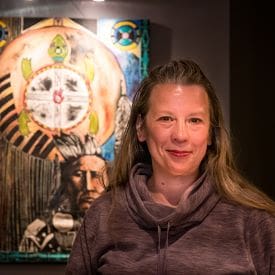Master’s Concentration
Arts and Culture Outreach and Advocacy
Develop skills needed to cultivate connections and advocate for arts and culture in communities of all kinds. In this program, you’ll learn to design engaging events and targeted programs, apply entrepreneurial thinking to help both nonprofit and for-profit organizations develop a strong community presence, and develop effective approaches to secure grant support. Be an advocate for the arts, prepared with the knowledge needed to thrive.

Let us help you succeed.
*Indicates a required field.
Top-ranked, career-focused education in a flexible format.
At a Glance
Classes Begin
March 31
Term Length
10 Weeks
Master's Tuition
$835 per credit hour
Asynchronous and Hybrid Online
No GRE or GMAT
As few as 18 months

Top-Ranked University by U.S. News & World Report

Connect with an Advisor
Chris Heriza
Text Me at 303-900-0375
Email Me
Call Me
Schedule an Appointment
Skills You’ll Learn
Curriculum
5
Core Courses
4
Concentration
Courses
3
Elective Courses
Featured Instructors
Sample Schedule
Plan out your schedule and determine your preferred timeline for completing your master's degree—finish in as few as 18 months or take up to five years.
Interested in a graduate certificate?
Explore our four and six course graduate certificates in Arts and Culture Outreach and Advocacy.
Take a Course Before You Apply
We know how important it is to get started when you’re ready and that’s why you can enroll in a course before you officially apply.
Career Outcomes
Predicted outcomes for graduates of Arts and Culture Outreach and Advocacy
Job Titles
Arts Advocate
Arts Program Director
Community Arts Manager
Event Planner/Promoter
Gallery Owner
Government Arts Program Manager
Program Manager Salary: National Average
$86,065
(Glassdoor.com)
Get Ahead with Career Services
One-on-one career coaching and mock interviews
Job database dedicated to DU students and alumni
Résumé and cover letter guidance
Hear from Our Students
Theme: Job Satisfaction
Arts and Culture Management
Flexible Online Classes
We understand the demands of balancing work, friends and family, and school can be challenging. That's why at University College, you can complete your program entirely online. Our online learning platform makes it easy to work anywhere at any time.
Accreditation
Higher Learning Commission
University College programs maintain the highest level of accreditation offered by The Higher Learning Commission, one of the regional accrediting bodies recognized by the federal government. The University of Denver and all of its academic programs are regionally accredited by this commission, and regional accreditation is the highest standard for universities in the United States.
Take the Next Step










